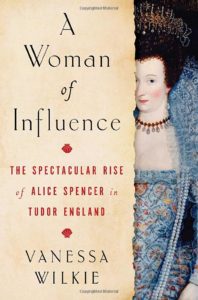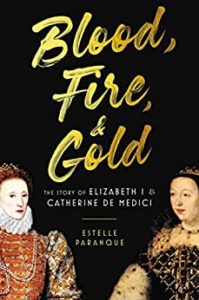Vanessa Wilkie’s book focuses on a powerful woman and her dynasty, a woman who should be much better known. This is a compelling story of upward mobility as Alice Spencer, the daughter of a wealthy sheep farmer, rose to wealth and status through two important marriages, married her daughters off extremely well, and worked hard to maintain all the right connections.
Status anxiety was rampant in this period and the author clearly lays out the importance of finding the right patron and keeping him happy, of marrying well, of expanding one’s holdings of land, and doing everything possible to rise higher. There was always the possibility of the Wheel of Fortune dropping you to the bottom in an instant. Doom could be quick and sudden and your head could end up on a pole.
There are times when the book reads like a thriller, as when Alice’s husband, the Earl of Derby, is approached by Catholic plotters who want him to depose Elizabeth and restore Catholicism in England. They pick him because he’s a descendant of Henry VIII’s sister and might be a Catholic despite publicly adhering to the Protestant faith. He alerts authorities that he plans to lead them to London where they should be arrested as traitors. The ride south takes several several days.
Given legitimate paranoia about attempts to overthrow the Queen, there was the chance that he himself could be arrested, tortured, and executed on suspicion of treason, leaving his wife ruined and persona non grata. It’s a harrowing episode in a generally well-wrought story of power and privilege.
In some ways, the Tudor period in which Alice began to rise feels very close to ours: she needed good publicity as she made her way into the upper realms of Tudor society and did everything possible to enhance the position of her three daughters. Alice, a book lover, was the recipient of fulsome praise via author’s dedications and thereby “gained social capital for being celebrated as [a patron] of the arts and religious works.” No less a poet than The Faerie Queene’s Edmund Spenser praised her in some really wretched verse that seems to have helped boost her reputation.
The prose in this book often undermines the strength of the narrative because it’s filled with words like “probably,” “likely,” “would have,” “could have, “maybe,” “surely,” “may have been,” and “very likely.”
The author does offer up some fascinating material, like the fact that there were actually two forms of secular court at the time whose jurisdiction overlapped: the common-law courts and so-called equitable courts that dealt with exceptions demanding demanded special attention. This comes up in the context of a nasty lawsuit brought by Alice’s brother-in law that lasted for well over a decade. And then there’s a bizarre, horrendous sex scandal worthy of the Marquis de Sade involving one noble daughter and granddaughter. It’s so freakish, it could truly have been the focus of a separate book.
Alice Spenser was a strong, determined woman who actively built and fostered “a political and social network” while creating “a persona of grandeur” and amassing “landed wealth and power.” Wilkie doesn’t downplay her faults–like being overly litigious and caring so very much about propriety–but deftly situates her in the complex, murky terrain of upper-crust Tudor and Stuart England.
Lev Raphael recently reviewed a dual biography of Queen Elizabeth I and Marie de Medici: Blood, Fire, and Gold.


